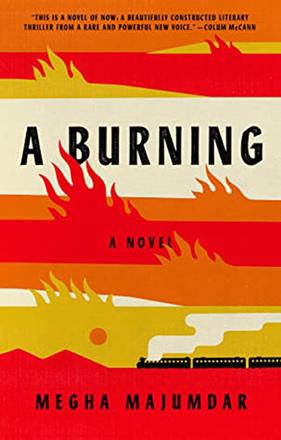- Mix
- Mon-2021-03-29 | 04:32 pm

Nayrouz News Agency :
Steeped in the sights, sounds smells and tastes of her native Kolkata, Megha Majumdar’s debut novel "A Burning” is original, extraordinary, and often jolting in both plot and style. The story is replete with betrayals, as poverty and humiliation drive some to do the unthinkable in order to get ahead. The book also takes a critical look at the power of social media and the press to invade privacy, manipulate public opinion and sabotage the justice system — and how a repressive state can use this to its advantage.
Much of the story is told in short chapters of first-person narrative by two young female characters: Jivan lives with her parents in the slums, but attended a good school until 10th grade, thanks to an NGO scholarship, and now works as a salesgirl; Lovely is a hijra, a transgender person, born male but living as a woman, which caused her to be disowned by her family. What links them is that Jivan is teaching Lovely English, needed for the acting career she is pursuing. More deeply, they are linked by the daily indignities they suffer because of being female, poor and outside the mainstream. At one point, Lovely realises that they are no more than insects in the eyes of the rich and powerful. Still, in the course of the novel, one of them will find a niche for herself, while the other will be totally banished.
The shortness of the chapters and the abrupt incisiveness of the young women’s narrations thrust the reader headfirst into the plot. Majumdar’s prose shines as she crafts each of their voices to reflect their respective backgrounds, while their outsider status gives them unique insight into how the world works, especially the corruption they see all around them. Despite the difference in their voices, the tone of the two young women is equally audacious in decrying unkindness, hypocrisy and unfairness.
Other chapters in third-person narrative centre on the lower-middle-class, physical-training teacher, dubbed PT Sir, at the girls’ school Jivan had attended. His function in the novel seems to be to provide a stark contrast to the two unconventional women, for he is ordinary to the point of boredom. Ironically, his very ordinariness leads him into betrayal and corruption, with fatal consequences.
Purely by chance, Jivan witnesses the torching of a train by unknown persons. The train doors are locked from the outside so the passengers have no escape. One hundred burn to death. Incensed by this horrible tragedy, Jivan posts on Facebook, blaming the government, and is quickly arrested. Eager to find a scapegoat for a crime they can’t easily solve, the authorities, aided by the media, compile a heap of circumstantial evidence and reinterpret Jivan’s online chats to charge her with the crimes of arson, terrorism and disloyalty to the state.
In prison, Jivan encounters new layers of corruption which can determine an inmate’s fate irrevocably. Undaunted, she plays the game, doing favours for select prisoners and wardens to get visits from a journalist who promises to get her side of the story into the newspapers. Desperate to prove her innocence, she tells her whole life story: Her family’s eviction from a coal-mining village by the police so that a company can establish a large, profitable mine; Her father’s police-inflicted injury which left him an invalid as they hadn’t the funds to get him proper medical care; and her mother’s struggle to feed the family after they landed in Kolkata’s slums. All in all, it is a trajectory showing how the system failed them at every turn because they were poor and powerless. Even as Jivan is telling her story from prison, her mother’s tiny food stand is attacked by thugs who tell her to "go back to Bangladesh”—a not-so-subtle reference to her being a Muslim.
Meanwhile, partly by chance and partly by design, PT Sir is becoming a rising star in JKP, the main Hindu opposition party. As a teacher, he serves as poster boy for school improvement and other community projects aimed at garnering votes for the party, but he is also assigned more nefarious tasks, such as giving false testimony in court trials that the party wants decided in a certain way, hoping to appear as a force for "law and order” and uphold the status quo. He knows Jivan from her time at school. How will he testify about her? By this time, the novel is brimming with suspense.
The fact that the plot is ignited by a train arson reminds of real events in India, especially the 2002 train fire in Gujarat that killed 60 Hindu pilgrims. In ensuing intercommunal riots, 1,000 were killed, mainly Muslims, imperilling interfaith relations for years. Recently adopted laws criminalising interfaith relationships can only add fuel to the flames. In Majumdar’s fictionalised account, there is also a mob scene in which Hindus are incited against Muslims.
While poverty is prominent in many books about India, not since Aravind Adiga’s "The White Tiger” (2008) has the depiction of its cancerous by-products been so visceral. In "A Burning”, Majumdar has delivered an engrossing story, full of human potential and but also of human frailty. It is a warning of what can happen when manhood is made contingent on violence against the Other, when people allow themselves to be pitted against one another by differences in religion, status and life style. In essence, "A Burning” is a cry for a more humane, just society, whereby one person’s success does not hinge on another’s demise.
-
 Will Trump end up like Kennedy?2026-02-03
Will Trump end up like Kennedy?2026-02-03








